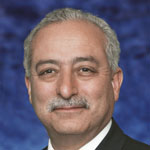Nelson Diaz grew up flirting with crime as a poor kid in the mean streets of NYC, an ironic beginning to his legendary career as the first Latino judge in Pennsylvania’s history. The legal pioneer looks back and shares with HE the moral of his story: open doors for others.
“Where I lived, heroes weren’t upstanding citizens.” To say that Diaz grew up poor would be an understatement. Before he was 10-years-old, the New York native lived in a series of single-room occupancies and rat-infested tenements that gave Diaz pulmonary illnesses and placed the at-risk youth in the belly of the beast. Gangs were on every corner and those in the immediate area glorified criminals. Diaz happened to live in the same area as “The Capeman,” a 16-year-old gang member named Salvador Agron who gained notoriety in 1959 by murdering two people. Agron was the youngest person ever sentenced to death in New York State, but the sentence was commuted by then-New York governor Nelson Rockefeller after Eleanor Roosevelt made pleas for clemency on Agron’s part, citing the dire economic straits of his family and his emotional impoverishment as the reasons for his crime.
Testimonials
“All of us have had mentors and advocates who have helped us along the way; the thing about Nelson is that he has filled that role for literally hundreds. I have never met anyone in the business community so singularly committed to mentorship. And that is why he is so loved.”
—Joseph Dominguez
Senior VP, Government and Regulatory Affairs & Public Policy, Exelon Corporation
“Nelson Diaz has impacted the Hispanic business community by serving as a role model for other Latinos through his success as a judge, lawyer, and business leader. Role models are important for helping to increase the number of Latinos on Fortune 1000 boards. Some people who achieve his level of success become guarded, but Nelson is warm and approachable with a genuine desire to help others. Like he has done with many others, Nelson has helped me by making introductions to other business leaders. Nelson has always delivered on his promises to me. That means more to me than the actual business benefits I have received from the introductions.”
—Frank A. Rodriguez
Founder, Chairman, & Chief Legal Officer, Corporate Creations International Inc.
“Judge Diaz is the ultimate mentor; he helps without expecting anything in return. Just because it’s the right thing to do for the right reason. You can’t ask for better than that—he is my hero.”
—Nilda Ruiz
CEO, Asociación Puertorriqueños en Marcha (APM)
“As a corporation that’s deeply committed to fostering workplace diversity in America and around the world, we are honored to salute the many significant accomplishments of Judge Nelson Diaz. Throughout his life and varied career—as lawyer, jurist, civil servant, and human-rights activist—he has worked for fairness and inclusion for all. He is a true inspiration and is so deserving of celebration and gratitude, not just from Hispanic Americans, but all Americans.”
–DuPont
“Congratulations to Judge Nelson Diaz on this
well-deserved recognition! Your advocacy and unceasing support and service throughout the years to the Puerto Rican/Latino and communities of color are most admirable. Asociación Puertorriqueños en Marcha and the Philadelphia community are deeply grateful and better off for it. Best wishes and continued success!”
–Asociación Puertorriqueños en Marcha (APM)
“Capeman lived in our community and he was seen as a hero,” Diaz says. “Where I lived, heroes weren’t upstanding citizens. There was also animosity between community members and the police, so the police were never a friendly presence in our neighborhood. It’s hard for a kid to make it out alive in that kind of environment—if I hadn’t gone into public housing, there is no telling how things could have gone for me.”
When Diaz was 10, his family qualified for public housing in Black Harlem and this transition set him on a more positive path, with baseball being one of Diaz’s saviors. He began playing for Leroy Otis, a local Negro League baseball player with one of the best teams in Harlem. Though, by the time Diaz was a teen, he was still flirting with disaster. That stopped when a minister came to the area and began working with the local gangs, taking an interest in Diaz.
“I went from being a D student in ninth grade to an A student in tenth grade,” he recalls. “That time in my life was pivotal; it changed my character and it was a very unique way to grow up. I was the only Latino kid on an African-American baseball team and I was being helped by this white hillbilly minister working with gangs. After that, I was on track.”
“There were really no people of color in the profession, and to a certain extent, not a lot has changed.” Diaz’s experiences growing up as a poor person of color shaped his point of view, but it was after he entered law school that his interest in activism really took hold. He and nine African-Americans were the only people of color studying law at Temple University and Diaz himself was just one of 34 Latino students enrolled at the university, despite it being in the heart of a Latino and African-American community. This realization sparked a fire in Diaz and he began traveling the country recruiting students of color to Temple, resulting in graduates such as Mari Carmen Aponte, the ambassador to El Salvador under President Barack Obama, judges Edward Rodriguez and Nazario Jimenez, and political leader Richard Montano.
“There were really no people of color in the profession and, to a certain extent, not a lot has changed in private law firms,” Diaz says. “Ninety percent of all law firms are still managed by white, male lawyers. There’s a reason so many Latinos grow up not seeing law as a possibility. Like a lot of kids today, I went to school to get a job and take care of my hardworking mother and family. I never thought I could affect change.”
After law school, Diaz began receiving business offers from New York, but in Philadelphia, no one was offering him a job—it was still pretty unheard of to be a Latino lawyer there. So he gave himself a deadline: he’d stay in Philadelphia for five years to see what he could change. Five years turned into 40, and as it turns out, he could change a lot.
Diaz’s drive took him to the White House as a fellow and he became the first presidentially appointed Latino general counsel. Back in Philadelphia, Diaz was mostly operating on a pro-bono basis when he helped revitalize business districts in Latino neighborhoods, increasing opportunities for minority professionals and empowering young radicals to explore different paths—including members of the Young Lords Party, an offshoot of the Black Panthers. He even got his former law firm to donate $1 million to help a local Latino community-development project.
“God must have a great sense of humor.” Fast-forward all these years later, and Diaz’s passion still hasn’t fizzled. The former judge now concentrates his efforts on increasing the number of Latinos who serve on corporate boards and making sure that Latinos don’t miss the opportunity to contribute to the emerging field of green energy and technology through his organization, the Association of Latino Energy and Environmental Professionals (LEEP).
“I’ve always thought that God must have a really great sense of humor,” Diaz says, “because technically, a guy like me should have ended up very different. I grew up in public housing, and I reformed public housing. I grew up in a crime-ridden area, and I ended up reforming the Philadelphia court system. I’ve done a lot in my life, but I can honestly say that opening doors is my greatest accomplishment. I want others to benefit from the opportunities that weren’t available to those who came before them. That is my proudest achievement.”

